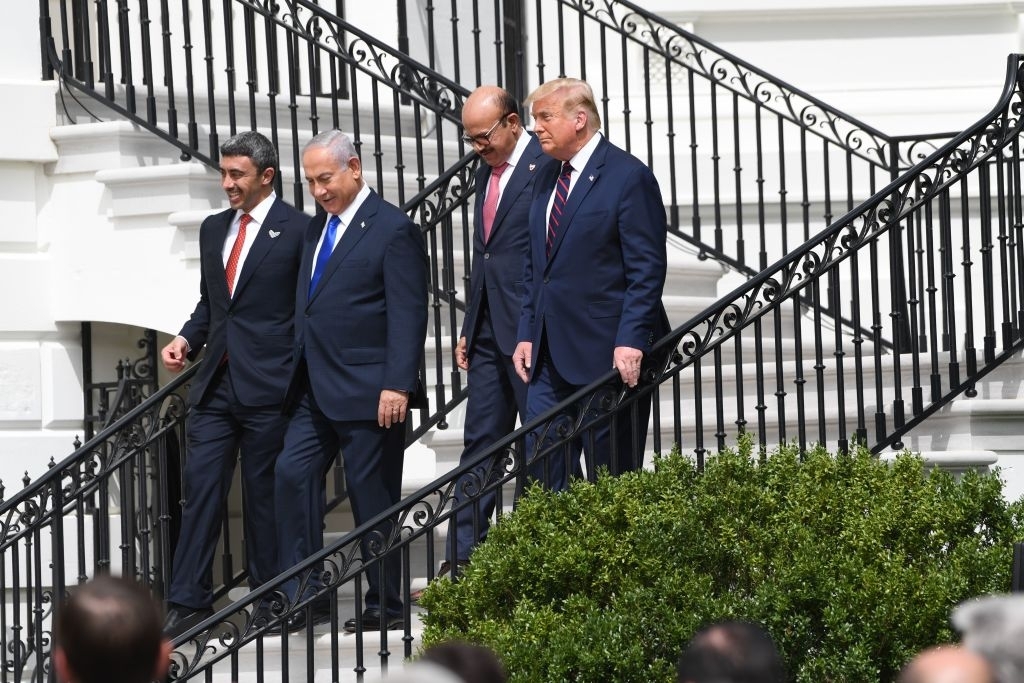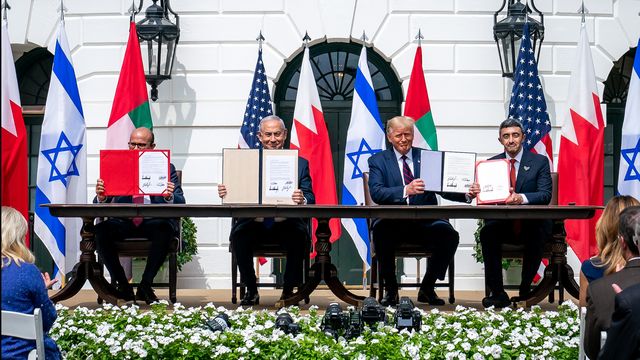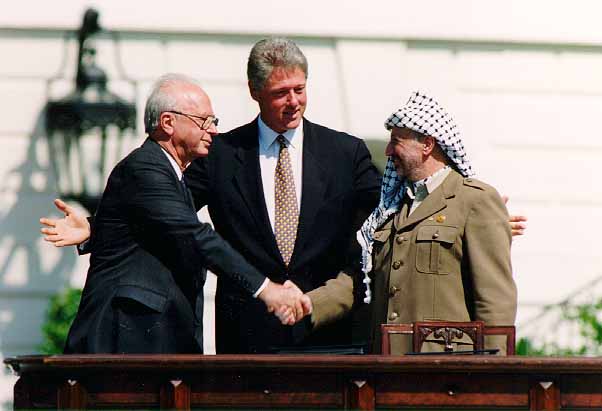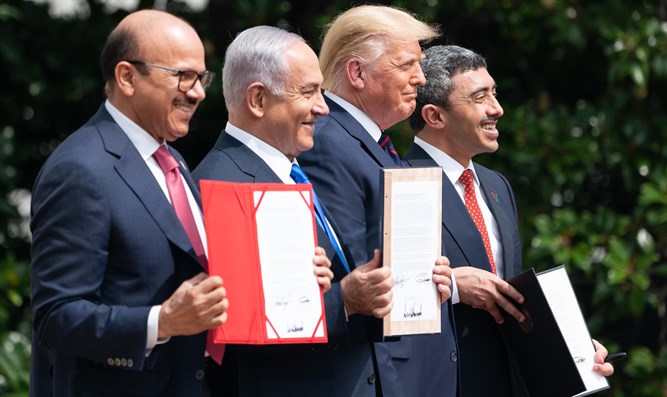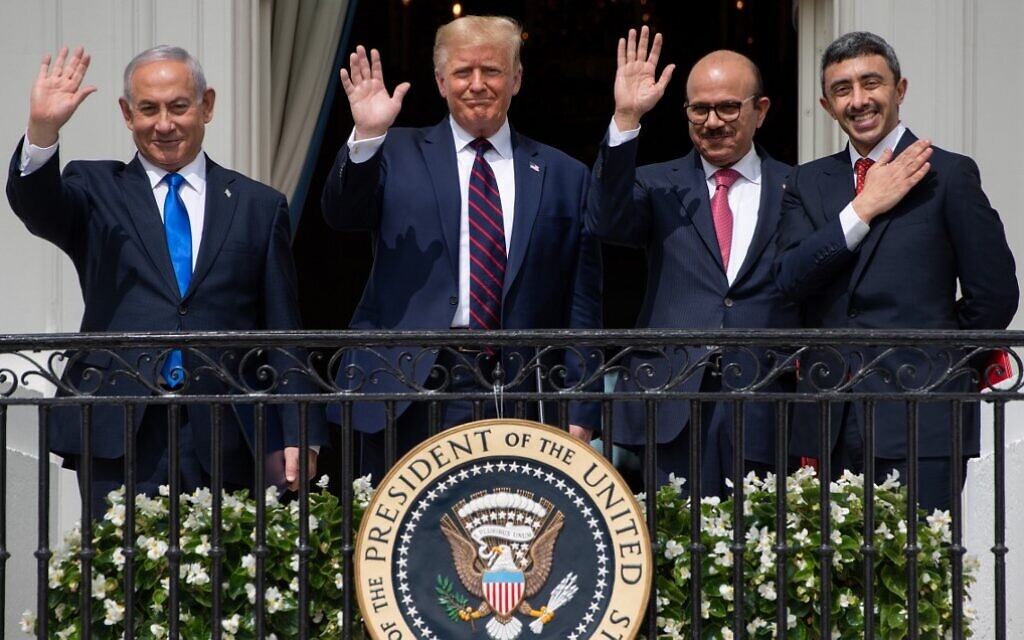The Abraham Accords or Another Oslo 3 Accord
The President of the U.S. Donald Trump hosted the signing of a historic accord between Israel, the United Arab Emirates, and Bahrain that entered the history as the Abraham Accords Peace Agreement. On the 15 of September 2020, the PM of Israel Binyamin Netanyahu, the FM Abdullah bin Zayed Al Nahyan of the United Arab Emirates, and the FM Abdullah bin Rashid Al Zayani of Bahrain signed formal pacts for peace in the White House. This historic acceptance of Israel by two important Arab nations on the basis of peace and mutual benefits. The UAE and Bahrain are the first Gulf states that joined Egypt and Jordan to officially normalize relations with Israel.
The Minister of Foreign Affairs of Bahrain Abdullatif bin Rashid Al Zayani, Prime Minister of Israel Benyamin Netanyahu, U.S. President Donald Trump, and Minister of Foreign Affairs of the UAE Abdullah bin Zayed Al Nahyan sign the Abraham Accords 15 September 2020 at the White House.
President Trump who opened the ceremony noted that the lies against Israel fed by hate and fear from generation to generation are no more. President Trump also stated on the Announcement of normalization of relations between Israel and the Kingdom of Bahrain the following,
“When I took office, the Middle East was in a state of absolute chaos. I’ve restored trust with our regional partners, and together we’ve eliminated the ISIS caliphate 100 percent; isolated the radicals who pervert Islam and sow instability. Today, nations across the region and throughout the world are joining together, united in their determination to build a better future, free from the evils which perpetuate terror. And I think you see that. I think you see that happening very, very strongly.“
The two Abraham Accords, brokered by the U.S. President Donald Trump, however, have different legal status though: The Peace Treaty with the UAE and the declaration of peace with the Kingdom of Bahrain. What is the difference?
With the UAE, the “peace treaty” requires a parliamentary ratification, and the “declaration of peace” with Bahrain is a commitment to peace. In the acceptance speeches, both Arab dignitaries stressed the peace motif and cooperation between Israel and the two Gulf nations for the sake of security and prosperity in the Middle East. The three nations agreed to establish diplomatic relations, although it is unclear in the official speeches whether the Arab Gulf nations will locate their embassies in Jerusalem. Both dignitaries also stressed on the importance of peace in the Middle East between Israel and the Palestinians.
The Abraham Accords Peace Agreement: Treaty of Peace between the UAE and Israel further states,
“Recalling the Treaties of Peace between the State of Israel and the Arab Republic of Egypt and between the State of Israel and the Hashemite Kingdom of Jordan, and committed to working together to realize a negotiated solution to the Israeli-Palestinian conflict that meets the legitimate needs and aspirations of both peoples, and to advance comprehensive Middle East peace, stability and prosperity;”
We should note, however, that the Abraham Accords Peace Agreement did not mention land or territories in reference to a solution to the Israeli-Palestinian conflict, but only a reference to the legitimate needs and aspirations of both peoples. For the full text of the Abraham Accords Peace Agreement: Treaty of Peace, Diplomatic Relations and Full Normalization Between the United Arab Emirates and the State of Israel, visit the official website of the White House.
The other side
On the other side, however, are those who see the signing of the normalization agreements with the UAE and Bahrain as another continuation of the unsuccessful Oslo Accords between Israel and the Palestinians: Oslo 3. They see the signed Abraham Accords as another step with which Benyamin Netanyahu has promoted the path of Yitzhak Rabin towards the establishment of a Palestinian state and the division of Jerusalem. The claim is that Netanyahu like Rabin conceded territory in exchange for normalization with Arab countries. However, this claim cannot be supported by the Abraham Accords in regard to Treaty of Peace with the United Arab Emirates and the Declaration of peace with Bahrain. However, according to unofficial statements, under the Abraham Accords, Israel agreed to suspend the planned annexation of areas of Judea and Samaria until 2024. It may look strange that nations that have never been in war had to sign peace accords. But the children of Abraham have never been in peace either, because everything began thousands of years ago.
The history of the Abraham Accords
First, we must recognize that the Arabs and Hebrews are descendants of a common ancestor, Abraham: the father of many nations. The burial of the patriarch in the cave of Machpelah was attended to by Isaac and Ishmael who although excluded from the blessings of the covenant, was acknowledged by God as the son of Abraham by a distinct blessing when Abraham said to Elohim, “Oh, let Ishmael live before You!” And Elohim said,
Truly, Sarah your wife is bearing a son to you, and you shall call his name Yitschak. And I shall establish My covenant with him for an everlasting covenant, and with his seed after him. And as for Ishmael, I have heard you. Look, I shall bless him, and shall make him fruitful, and greatly increase him. He is to bring forth twelve princes, and I shall make him a great nation. But My covenant I establish with Yitschak, whom Sarah is to bear to you at this appointed time next year. (Gen 17:18-21)
And when the patriarch died in a good old age of 175, his sons Isaac and Ishmael buried him in the cave of Machpelah, before Mamre, in the field which Abraham purchased from the sons of Chet. There Abraham was buried with Sarah his wife (Gen 25:7-10). We should note the peculiar wording used in the Torah to describe the burial of the common ancestor of the Arabs and Hebrews: “And Isaac and Ishmael his sons buried him …” (Gen 25:9). Even though Ishmael was the senior son of Abraham, and in fact his firstborn, Yitschak is mentioned first as he was born by Avraham’s wife, Sarah, while Ishmael was the son of a servant, Hagar.
From this the ancient sages gathered that Ishmael repented of his evil ways (see Bava Batra 16b) and yielded the precedence to Isaac. This is what is meant by the “good old age” referring to their father Abraham (Bereishit Rabbah 38:12). We should also note here that although the sons of Keturah, Abraham’s concubine (Gen 25:1, 6), were also in this region, they were not honored to bury their father, because Isaac and Ishmael had been more beloved by Abraham than the sons of Keturah. Besides, Abraham had already sent those sons away during his lifetime so that only Isaac and Ishmael remained close to him. This may be explained on the ground that Abraham did not place Keturah on the same footing as Sarah, his sole wife, the mother of the promised seed, nor did he give her the status Hagar had in the family, so that for the world history Isaac and Ishmael would be known as the sons of Abraham.
So, since Ishmael was the senior of all the sons of Abraham, the Torah should have mentioned his name first in Gen 25:9. But the fact that the Torah did not do so shows that the natural order was shifted which gave the reason for the Sages to say that Ishmael humbled himself, while Avraham was still alive, and acknowledged Isaac’s status as Abraham’s promised descendant. In support of this is the fact that the Torah does not mention Ishmael as a son of Abraham, after the birth of Isaac (with the exception in the genealogy in Gen 25:12), but with Hagar who had mothered him. However, when the Torah speaks of Isaac, it does not describe him as the son of Sarah, but as the son of Abraham, his father. And even though, Ishmael was the son of the female servant, Abraham loved him, because he was his firstborn son, and Elohim blessed him on account of Abraham, and this was why Ishmael was so successful, and so are his descendants, the Arabs.
In contrast, however, we see that when Isaac died, the Torah writes in Gen 35:29: “Esav and Jacob his sons buried him”. Clearly, this contrast between these two records must tell us that unlike Ishmael who humbled himself at the grave of his father, Esav did not. And on the account of this, Esav who although born of the same mother, was not chosen to be the one through whom the promised nation was to be established. And even though Esav sold his birthright for a bowl of lentil, the Torah still lists Esav as the elder brother telling us that he did not humble like Ishmael. We recall also that YHVH Elohim blessed Isaac and Ishmael, but there were no blessings on Esav.
Ishmael repents
And these were the years of the life of Ishmael: one hundred and thirty-seven years. And he breathed his last and died, and was gathered to his people. (Gen 25:17)
The Sages have noted that the phrase “breathed his last” or “expired” is only used with the righteous, as it is explained in Bava Basra 16b. According to Nachmanides, the Sages offer a variety of reasons why the Torah goes into such detail about the years of Ishmael and his sons. They say that the text the Torah details much about the lives of the righteous and their offspring, while it is sparse with information about the wicked. For instance, we are given information on the genealogy of Ishmael and Isaac, but we have nothing as to how old Esav was when he died, although it is clear from the Scripture that he survived his twin brother Jacob. The story of the patriarchs is considered closed with the death of Jacob, so that no further reference is made to his brother Esav. Again, “breathed his last” is used only in connection with the righteous people. This must tell us that according to the plain meaning of the text, the Torah wrote that his son Ishmael died as a righteous person on the account of his repentance.
We should note here another peculiar phrase in Gen 25, namely, the text is telling us that when Ishmael died, he “was gathered to his people”. But to whom of his people was Ishmael gathered, since he was the father of his people, is not clear? Should it not be said: to his father Abraham? Yet, the Torah recorded that he was gathered to his people. We find the same expression concerning Abraham’s death, as we read,
And Abraham breathed his last and died in a good old age, aged and satisfied, and was gathered to his people. (Gen 25:8)
What it means according to the plain meaning of the text, is that Ishmael was considered by the Torah righteous and was reckoned with the righteous ancestors of his father Abraham. Only then the Torah can say that Ishmael “was gathered to his people”.
With all that being said, we will agree with the Sages that Ishmael repented and acknowledged that his younger brother Isaac was the promised son, and Ishmael was blessed by Elohim who made him fruitful, and greatly increased him. At the grave of their father Abraham, both brothers put aside their differences and animosities and gave him the last respect he deserved. Ishmael had no more jealousy and hatred and Isaac had no more fear. And if this is so, we should agree with the Rabbis who see the signing of the Abraham Accords as repentance of Ishmael’s descendants who in the recent years expressed the desire to normalize their relations with Israel for the sake of peace and prosperity.
The descendants of the Abraham Accords
And this is the genealogy of Ishmael, Abraham’s son, whom Hagar the Egyptian, Sarah’s female servant, bore to Abraham. (Gen 25:12)
Keil and Delitzsch Commentaries on the Old Testament explain the genealogy of Ishmael.
Nebayot and Kedar (Gen 25:13) are mentioned in Isa 60:7 as rich possessors of flocks. The Nabataeans held possession of Arabia Petraea, with Petra as their capital, and subsequently extended toward the south and north-east, probably as far as Babylon; so that the name was afterwards transferred to all the tribes to the east of the Jordan, and in the Nabataean writings became a common name for Chaldeans (ancient Babylonians), Syrians, Canaanites, and others.
The Kedarenes are mentioned in Isa 21:17 as good bowmen. They dwelt in the desert between Arabia Petraea and Babylon (Isa 42:11; Psa 120:5).
Dumah (Gen 25:14) and his descendants settled in the land Tema and became a trading people (Job 6:19; Isa 21:14), on the border of the Syrian desert.
Yetur and Naphish (Gen 25:15) were neighbors of the tribes of Israel to the east of the Jordan (1Ch 5:19), who made war upon them along with the Hagrites.
Hadad (Gen 25:15) settled along the Arabian coast land, between today’s Oman and Bahrain, a land renowned for its lancers. This makes Hadad the father of the Arabs of the Emirates and Bahrain: the children of the Abraham Accords.
The other names in the genealogy of Ishmael are not satisfactorily determined in the Scripture. The descendants of Ishmael listed by name in Gen 25 resided in different regions extending from Chavilah as far as Shur, east of Egypt, as these were the regions which became their ancestral holdings (Gen 25:18). This makes the Arabs living in the peninsula between the Red Sea and the Persian Gulf, the true children of Ishmael.
The Abraham Accords with Ishmael, but not with Esav
We live in remarkable times when the Middle East is being reshaped just before our eyes. But the Abraham Accords that we are witnessing was not the first one that took place. There have been two peace agreements with Israel in the last 72 years: with the Hashemite Kingdom of Jordan and Egypt. The Abraham Accords are now the third peace agreement that was signed at the White House, and most likely there will be more to follow. However, the peace with agreements with Jordan and Egypt are not subject of this talking point.
The Oslo Accords with the Edomites
The Oslo Accords 1 and 2 created the Palestinian Authority tasked with limited self-governance of parts of the West Bank and Gaza Strip and acknowledged the PLO as Israel’s partner in the future negotiations. The Oslo Accords were based on the 1978 Camp David Accords which President Carter negotiated without success.
The Oslo Accords are a pair of agreements between Israel and the Palestine Liberation Organization (PLO), brokered by President Clinton: the Oslo 1 Accord, signed in Washington, D.C., in 1993, and the Oslo 2 Accord, signed in Taba, Egypt, in 1995. Why did the Oslo Accords really failed to bring peace in the Middle East? Because they were signed with the children of Esav (Edom): Palestinians, not with the children of Ishmael: the Arabs. Besides, there is no record in the Scripture of blessings on Edom, nor is there any record of repentance on the side of Edom. The Edomites remained the worst enemies of Israel, which we are still witnessing today. Also, the Oslo Accords were forced by America on Israel to give up more and more “land for peace”. And as Israel was giving up more “land for peace”, more violence was irrupting from the “Palestinians”. However, the Abraham Accord with the true Arabs is different from the Oslo Accords with the Edomites.
The Abraham Accords were not forced but accepted by both parts. President Trump negotiated the agreements and indeed both sides had to make concessions. But this is how peace is negotiated between brothers. While the “Palestinians” (Edomites) were receiving land for almost nothing in return but empty promises for “peace”, the Abraham Accords were settled on equality in the negotiations. We may rightly call the Abraham Accords “trade for peace”, as they will lead the Arabs and Jews to economic cooperation and prosperity. Just compare the photos of the Oslo Accords and the Abraham Accords.
In conclusion, the things are happening in the Middle East that nobody thought was even possible. After President Trump affirmed the U.S. support for Israel and moved the American embassy to Jerusalem, thus recognizing that the ancient city as the capital of Israel. Then President Trump recognized the Golan Heights and from the position of political strength the Abraham Accords was made possible. The Abraham Accords of Israel with the UAE and Bahrain are political and economic in nature that are expected to increase Israel’s GDP. In light of this, Netanyahu’s decision seems the first two steps in the right direction. Along with the economic benefits, the Abraham Accords with the UAE and Bahrain will bring more Arab countries which have already expressed the desire to join the Abraham Accords so that Ishmael’s repentance will be full. This will inevitably bring political dividends too in the regional security, especially against the common enemy of the Arabs and Jews: Iran.
Most certainly, the Abraham Accords between Israel and the UAE and Bahrain will begin to reshape the Middle East politics from the Palestinian issues to the fight against the Iranian threat. But perhaps, the most beneficial outcome of the Abraham Accords will be that the world may see that the Arabs and Israelis are not enemies; they are brothers. Iran is the enemy of both Arabs and Israelis. The United Arab Emirates and Bahrain have taken positive steps in moving out of the narrow-minded religious extremism towards tolerance, peace and regional security between the descendants of the common father Abraham: the Arabs and Jews. Oman and Egypt already praised the two Gulf states’ decision to establish diplomatic relations with Israel, thus signaling that Oman could be the next Arab state to follow suit and formalize ties with Israel, as well. Egypt indeed praised the Abraham Accords, but the Hashemite Kingdom of Jordan did not. Hopefully, this repentance of Ishmael is sincere, and we will see more Arab nations joining the Abraham Accords with Israel. One is sure though, The Abraham Accords cannot alter, change, modify, much less replace the Abraham Covenant of the Most High which He made with Abraham and his descendants according to the promise.
The land promised to Israel is irrevocable according to the Covenant. And what many do not realize is that the Covenant of YHVH Elohim that grants the land from the Nile to the Euphrates to the descendants of Jacob-Israel does not diminish the blessing on Ishmael and his offspring, who are the true Arabs. The Promised Land does not violate by any means the borders of the land the descendants of Ishmael live in today. As for the other peoples who live in the Middle East, they are not true Arabs. As a matter of fact the Edomites are not Arabs at all; they are descendants of Esav (Edom), the twin brother of Isaac, not of Ishmael.
But for more information on this controversial issue, refer to the articles The Palestinians—the Indigenous People in the Hashemite Kingdom of Jordan, The Time When the Hashemite Kingdom of Jordan will Exalt Against Israel’s Borders, and Within Three Years the Hashemite Kingdom of Jordan is to be Despised.
Therefore, anyone who misuse the Abraham Accords between Arabs and Jews, namely, that they do not replace the Abraham Covenant with Israel, will face the dire consequences of the War of Gog of Magog before the coming of the anointed One of YHVH Elohim.
Navah
May we merit seeing the coming of our Mashiach speedily in our days.

